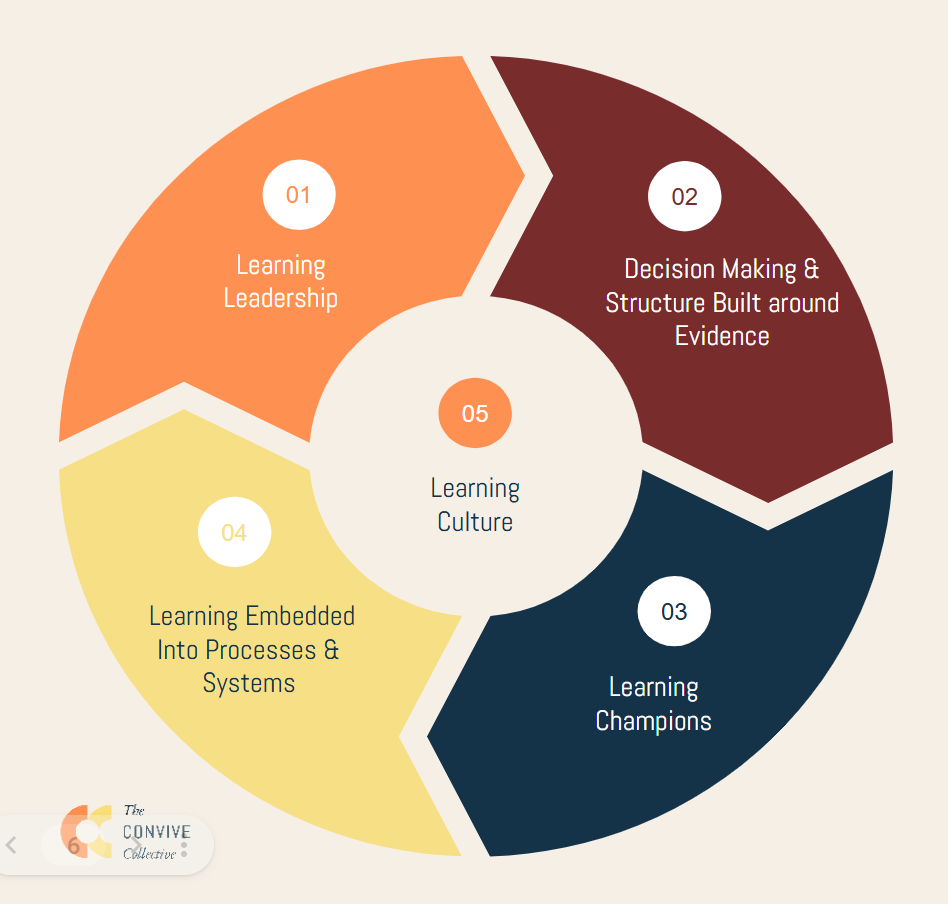
This is the second session in a series aimed at stimulating learning in programs, as an organisation and in an equitable way, together with partners. In the first session, we looked at how program-specific lessons can be turned in and used as organisational legacy for future programmes. In this second session, we looked into what organisational conditions are needed to make the best use of staff, ensuring that learning enhances impact.
A Shared Learning Organisation Framework
Katherine Haugh proposed a Shared Learning Organisation Framework. This framework outlines what it means to be a learning organisation, and what steps to take to help their organisation become one.
-

Learning Leadership models, incentives, and promotes learning behaviours and practices
- Decision making is informed by evidence and organisational structures are fit to purpose and enable learning
- Learning Champions are valued and keep learning practices alive, useful, and in demand
- Learning Embedded in Processes + Systems enables partners and philanthropies to continuously learn and improve
- Culminating in a Learning Culture in which learning is the norm, not the exception.
For more information on this framework, please see the presentation attached on the right.
“When we have a shared language, we create a pathway to a shared understanding of what it means to be a learning philanthropy. A shared understanding (and language) is critical for organisational change!”
Katherine Haugh – CEO of Convive Collective
Liliane fonds’ learning journey
Loïs Peltzer and Jan Apperloo continued the session by presenting the learning journey of Liliane Fonds. Peltzer highlighted key insights from her research on how the organisation can evolve into a true learning organisation. Following this, Apperloo outlined the concrete steps that they have taken to strengthen learning within the organisation. These steps include:
• Developing an organisation-wide learning strategy that encourages leaders to openly share lessons learned
• Establishing equitable decision-making structures
• Appointing learning champions to drive learning initiatives
• Leveraging a partner platform and AI tools to enhance knowledge management
• Organising staff intervision in small groups to foster a safe and supportive environment for reflection and discussion
Key takeaways from the breakout groups
At the end of the session, the group split up in break-out groups to further dive into specific elements of organisational learning, sharing the experiences of different organisations, namely:
- Embedding learning into core processes and systems (hosted by Sarah Abdelatif, Propel)
- Using evidence-based methods (hosted by Leonie Meijerink, War Child)
- Building a learning culture: the foundation for organisational resilience and innovation
(hosted by Nina Pavlovska, Zeza Learning Experience Design)
Key Takeaways
Building a strong learning culture involves creating structures that support both sharing knowledge and seeking it from others. A strong learning culture is one where learning is safe, expected, supported, and applied. People must feel comfortable sharing mistakes, be encouraged to grow, and have the tools to apply what they learn.
Power dynamics such as hierarchy or identity can inhibit open learning, so it’s important to create an environment where vulnerability is accepted and diversity is valued. A safe environment should be created where people’s individual characteristics are considered. Learning should also be recognised as a leadership capability; a willingness in leaders to reflect, adapt, and model continuous learning should be celebrated.